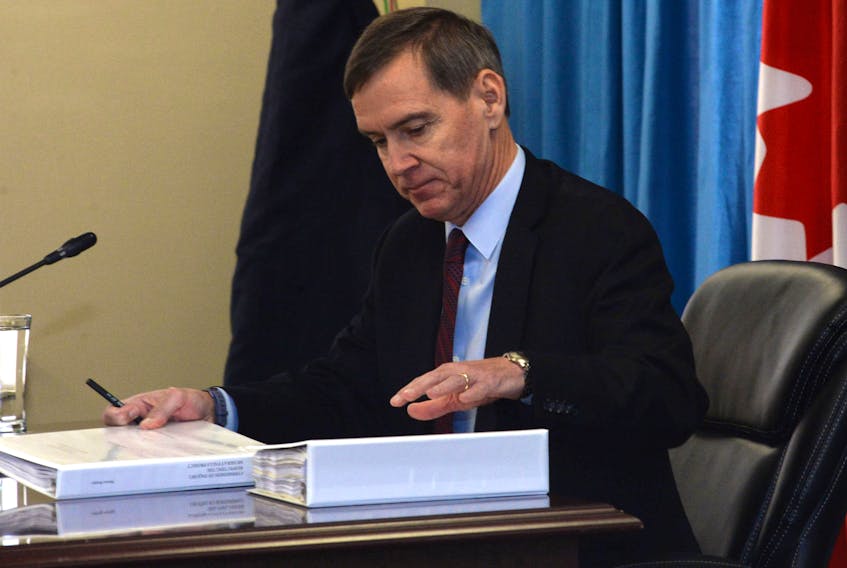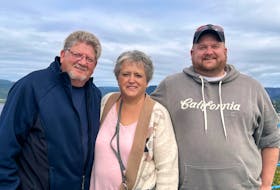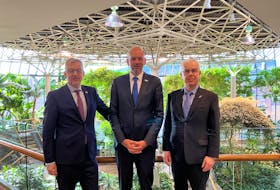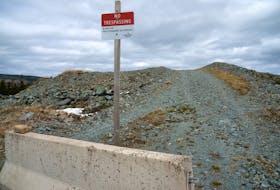From utilities to contractors to politicians — quite a few politicians and civil servants — everyone seeking standing before the Commission of Inquiry Respecting the Muskrat Falls Project were called on to make their case Friday.
In the freshly carpeted hearing room on the third floor of the Beothuck Building, Justice Richard LeBlanc opened the session by issuing some general comments and offering a rough schedule including more than 100 days of hearings ahead, before his final report at the end of 2019.
One by one, LeBlanc questioned the applicants — either directly, or their attorneys — on why they felt full standing, limited standing or special standing was needed.
Standing essentially gives the right to participate in the inquiry. “Special standing” means participation is limited to submissions on an area of expertise; “limited standing” allows for powers including the right to question witnesses, but only for a portion of the inquiry; while “full standing” allows for direct involvement throughout.
Having standing does not affect whether or not a participant is called as a witness, or sought to provide expert input.
To be determined
LeBlanc did not issue all decisions Friday. He opted to take more time to determine the extent standing might be granted to Indigenous governments, for example.
This includes applications from the Nunatsiavut Government, Innu Nation and Conseil des Innu d’Ekuanitshit (with a reserve in southern Quebec, but traditional territory extending into what is now Labrador).
There were decisions reserved in respect to applications by several citizens’ and grassroots organizations, including the Labrador Land Protectors and Grand Riverkeeper Labrador, who had representatives flown from Happy Valley-Goose Bay to St. John’s to attend the hearing.
For the Labrador Land Protectors, Marjorie Flowers told The Telegram she was bothered by the decision to hold the majority of hearings in the provincial capital, even considering the costs.
“(But) I feel completely satisfied with our presentation. We said what we had to say and I think we conveyed the message it’s just as important to us now as it was all along,” she said.
The Grand Riverkeeper’s Roberta Benefiel said it has been difficult for the groups to jointly find a lawyer who was not already committed, or in a position of possible conflict.
LeBlanc spent much of his time determining financial requests and requirements for the groups, asking about the number of members who might travel for inquiry hearings.
The politicians
He immediately awarded the provincial government, specifically the Crown, full standing, with attorney Peter Ralph.
Ralph outlined his role, saying his instructions come from the executive branch, specifically the deputy clerk of the executive council.
A roster of current and former provincial politicians was also in the mix of applicants.
Neither Premier Dwight Ball nor any members of his Liberal government have sought standing as individuals or as a group, the commissioner noted.
Former Newfoundland and Labrador premiers Kathy Dunderdale and, as a collective, Paul Davis, Tom Marshall and Danny Williams, have been given full standing.
None of the premiers were on hand, being represented by their respective lawyers.
Dunderdale (premier from December 2010 to January 2014), was represented by Bruce Grant of Stewart McKelvey.
Davis (premier from September 2014 to November 2015), Marshall (January 2014 to September 2014) and Williams (November 2003 to December 2010) are part of a single group, known as “Former government and officials: 2003 to 2015.” It also includes former ministers of natural resources Shawn Skinner, Jerome Kennedy and Derrick Dalley. The group is represented by Tommy Williams of O’Dea Earle.
The public servants
The list of applicants included a smattering of public servants past and present, who were at the heart of the decision-making machine behind the project.
LeBlanc reviewed applications from the province’s auditor general (a former clerk of the executive council) Julia Mullaley, former clerk of the executive council Robert Thompson, and Charles Bown, the current lead of a major projects unit of the executive council and former deputy minister of Natural Resources, granting all full standing.
Past CEO Ed Martin
Former Nalcor Energy president and CEO Ed Martin was accompanied by his attorney, but spoke for himself on his application. He was granted full standing.
Martin argued he could contribute to the work of the inquiry, but also there was a risk to both his own reputation and the inquiry’s final results if he was not a participant.
“If I’m not here, if I’m not filling in the blanks and giving the full facts, I’m concerned and afraid what could happen is that only the partial information, incomplete and sometimes incorrect information will be here to form the basis of the commission’s finding,” he told reporters outside of the hearing room.
Martin said he is confident in the early decision-making and, acknowledging the project’s cost overruns, still believes it to be an overall positive contribution to the province’s future.
Utilities, contractors and more
Nalcor Energy was separately given full standing.
A decision was reserved for the board members who led the corporation during Martin’s tenure, with some clarity needed on who their costs would fall to (their own backs, Nalcor Energy’s or otherwise).
The consumer advocate was an applicant, but required some mechanism to be introduced to extend his powers, and cover his costs, for participation in an inquiry. Specifically, he suggested, an Order in Council from the Liberal government.
Other applicants were granted partial standing, specific to addressing questions around the project’s construction.
The Muskrat Falls Concerned Citizens Coalition — led by David Vardy, Ron Penney and Des Sullivan — was granted full standing.
Applications for standing
Full standing awarded
Nalcor Energy (Dan Simmons, McInnes Cooper)
Her Majesty the Queen in right of Newfoundland and Labrador (Peter Ralph)
Ed Martin (Harold Smith, Stewart McKelvey)
Kathy Dunderdale (Bruce Grant, Stewart McKelvey)
Muskrat Falls Concerned Citizens Coalition
Julia Mullaley (Andrew Fitzgerald, Lewis, Sinnott, Fitzgerald)
Charles Bown (Andrew Fitzgerald, Lewis, Sinnott, Fitzgerald)
Robert Thompson (Bernard Coffey)
Former government and officials: 2003-15* (Thomas Williams, O’Dea Earle)
Danny Williams
Tom Marshall
Paul Davis
Shawn Skinner
Jerome Kennedy
Derrick Dalley
Partial standing
Emera (Glen Noel, Cox and Palmer)
Astaldi Canada (Lena Wang and Jay Nathwani, Glaholt LLP)
Newfoundland Building and Construction Trades Council, and Resource Development Trades Council of N.L. (RDTC) (Valerie Hynes, Roebothan McKay Marshall)
Decision reserved
Philip Helwig
Innu Nation (Senwung Luk)
Nunatsiavut Government
Conseil des Innu d’Ekuanitshit (David Janzen, Dionne Shultze)
Consumer advocate
Democracy Alert, Council of Canadians – St. John’s and Social Justice Co-operative N.L.
Newfoundland Power (Ian Kelly, Curtis Dawe)
Grand Riverkeeper Labrador and Labrador Land Protectors
Former Nalcor Energy board members: 2004-16 (Glenda Best)
Ken Marshall
Tom Clift
Gerry Shortall
Leo Abbass
(NOTE: Legal representation is identified in brackets. The group represented by Thomas Williams at O’Dea Earle was granted full standing as a group, with the ability to seek individual standing should matters arise requiring it to be considered.)
***
Inquiry schedule
Justice Richard LeBlanc has decided to break down the Commission of Inquiry Respecting the Muskrat Falls Project into distinct sections, with three phases of hearings.
Phase 1 — Primarily dealing with pre-sanction matters, including the involvement of the Public Utilities Board. Public hearings: Sept. 17, 2018 to Dec. 6, 2018, with the possibility of a further week if required.
Phase 2 — Construction and oversight by Nalcor Energy and government. Public hearings: Feb. 4, 2019 to April 4, 2019, and April 29, 2019 to May 16, 2019.
Phase 3 — Policy and potential systemic matters focused on looking forward. Public hearings: June 17, 2019 to July 4, 2019.
Final submissions — early August 2019.
(NOTE: Dates remain tentative, but the commissioner said the schedule should not change drastically from these dates. Most days will be in St. John’s, but arrangements are being made for hearing dates in Labrador.)
***
From the commissioner
“You know, we talk about the democratic deficit. I only wish that I had the time to delve into the democratic deficit. I think in some ways there will be some issues that we deal with in this inquiry that will speak to the involvement of the public and in terms of potentially public utilities boards, things of that nature; but this inquiry is not about deciding what the democratic deficit is, if there is one. I, to be quite frank, based on what I’ve seen to date, in terms of what I have to get through, I’m going to be lucky if I can get through what I have here. And I’m not minimizing the importance of that (concept of democratic deficit), but I also have to be mindful of the mandate given to me.”
Justice Richard LeBlanc, before awarding full standing to the Muskrat Falls Concerned Citizens Coalition, led by David Vardy, Des Sullivan and Ron Penney









